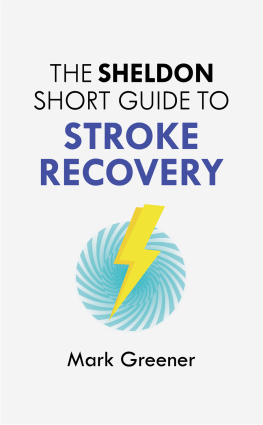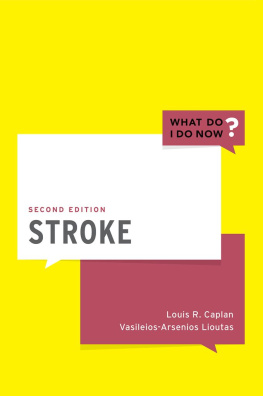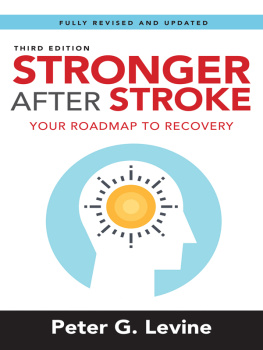Caplan - Navigating the Complexities of Stroke
Here you can read online Caplan - Navigating the Complexities of Stroke full text of the book (entire story) in english for free. Download pdf and epub, get meaning, cover and reviews about this ebook. City: USA;Oxford, year: 2014;2013, publisher: Oxford University Press, genre: Home and family. Description of the work, (preface) as well as reviews are available. Best literature library LitArk.com created for fans of good reading and offers a wide selection of genres:
Romance novel
Science fiction
Adventure
Detective
Science
History
Home and family
Prose
Art
Politics
Computer
Non-fiction
Religion
Business
Children
Humor
Choose a favorite category and find really read worthwhile books. Enjoy immersion in the world of imagination, feel the emotions of the characters or learn something new for yourself, make an fascinating discovery.

- Book:Navigating the Complexities of Stroke
- Author:
- Publisher:Oxford University Press
- Genre:
- Year:2014;2013
- City:USA;Oxford
- Rating:5 / 5
- Favourites:Add to favourites
- Your mark:
- 100
- 1
- 2
- 3
- 4
- 5
Navigating the Complexities of Stroke: summary, description and annotation
We offer to read an annotation, description, summary or preface (depends on what the author of the book "Navigating the Complexities of Stroke" wrote himself). If you haven't found the necessary information about the book — write in the comments, we will try to find it.
Caplan: author's other books
Who wrote Navigating the Complexities of Stroke? Find out the surname, the name of the author of the book and a list of all author's works by series.
Navigating the Complexities of Stroke — read online for free the complete book (whole text) full work
Below is the text of the book, divided by pages. System saving the place of the last page read, allows you to conveniently read the book "Navigating the Complexities of Stroke" online for free, without having to search again every time where you left off. Put a bookmark, and you can go to the page where you finished reading at any time.
Font size:
Interval:
Bookmark:
Navigating the Complexities of Stroke
Lisa M. Shulman, MD
Editor-in-Chief, Neurology Now Book Series
Fellow of the American Academy of Neurology
Professor of Neurology
University of Maryland School of Medicine
Baltimore, MD
Other Titles in the Neurology Now Book Series
Navigating Life with Parkinson Disease
Sotirios A. Parashos, MD, PhD; Rose Wichmann, PT; and Todd Melby
Navigating Life with a Brain Tumor
Lynne P. Taylor, MD, FAAN; Alyx Porter Umphrey, MD; and Diane Richard
Louis R. Caplan, MD
Professor of Neurology
Harvard University
Senior Neurologist
Beth Israel Deaconess Medical Center
Boston, MA


Oxford University Press is a department of the University of Oxford.
It furthers the Universitys objective of excellence in research, scholarship,
and education by publishing worldwide.
Oxford New York
Auckland Cape Town Dar es Salaam Hong Kong Karachi
Kuala Lumpur Madrid Melbourne Mexico City Nairobi
New Delhi Shanghai Taipei Toronto
With offices in
Argentina Austria Brazil Chile Czech Republic France Greece
Guatemala Hungary Italy Japan Poland Portugal Singapore
South Korea Switzerland Thailand Turkey Ukraine Vietnam
Oxford is a registered trademark of Oxford University Press in the UK
and certain other countries.
Published in the United States of America by
Oxford University Press
198 Madison Avenue, New York, NY 10016
American Academy of Neurology 2013
First issued as an Oxford University Press paperback, 2013
All rights reserved. No part of this publication may be reproduced, stored in a retrieval system, or transmitted, in any form or by any means, without the prior permission in writing of Oxford University Press, or as expressly permitted by law, by license, or under terms agreed with the appropriate reproduction rights organization. Inquiries concerning reproduction outside the scope of the above should be sent to the Rights Department, Oxford University Press, at the address above.
You must not circulate this work in any other form
and you must impose this same condition on any acquirer.
Library of Congress Cataloging-in-Publication Data
Caplan, Louis R.
Navigating the complexities of stroke / Louis R. Caplan, MD, professor of neurology,
Beth Israel Deaconess Medical Center, Boston, Massachusetts.
pages cm
Includes bibliographical references and index.
ISBN 9780199945719 (alk. paper)
1. Cerebrovascular disease. I. Title.
RC388.5.C3294 2014
616.81dc23 2012043697
This material is not intended to be, and should not be considered, a substitute for medical or other professional advice. Treatment for the conditions described in this material is highly dependent on the individual circumstances. And, while this material is designed to offer accurate information with respect to the subject matter covered and to be current as of the time it was written, research and knowledge about medical and health issues is constantly evolving and dose schedules for medications are being revised continually, with new side effects recognized and accounted for regularly. Readers must therefore always check the product information and clinical procedures with the most up-to-date published product information and data sheets provided by the manufacturers and the most recent codes of conduct and safety regulation. The publisher and the authors make no representations or warranties to readers, express or implied, as to the accuracy or completeness of this material. Without limiting the foregoing, the publisher and the authors make no representations or warranties as to the accuracy or efficacy of the drug dosages mentioned in the material. The authors and the publisher do not accept, and expressly disclaim, any responsibility for any liability, loss or risk that may be claimed or incurred as a consequence of the use and/or application of any of the contents of this material.
Disclosure statements for potential conflicts of interest provided by the authors are available
upon request from the American Academy of Neurology, 201 Chicago Avenue, Minneapolis,
MN 55415; Attn: Neurology Now Books.
1 3 5 7 9 8 6 4 2
Printed in the United States of America
on acid-free paper
Lisa M. Shulman, MD
Murray Sagsveen, JD, and Laurie Hanson, JD
Here is a question for you:
If you know more about your neurologic condition, will you do better than if you know less?
Well, not simply optimism but hard data show that individuals who are more knowledgeable about their medical conditions do have better outcomes. So learning about your neurologic condition plays an important role in doing the very best you can. The main purpose of both the American Academy of Neurologys (AANs) Neurology Now book series and Neurology Now magazine is to focus on the needs of people with neurologic disorders. Our goal is to view neurologic issues through the eyes of people with neurologic problems, in order to understand and respond to their practical day-to-day needs.
So, you are probably saying, Of course, knowledge is a good thing, but how can it change the course of my disease? Well, health care is really a two-way street. You need to find a knowledgeable and trusted neurologist; however, no physician can overcome the obstacle of working with inaccurate or incomplete information. Your physician is working to navigate the clues you provide in your own words combined with the clues from their neurologic examination, in order to arrive at an accurate diagnosis and respond to your individual needs. Many types of important clues exist, such as your description of your symptoms or your ability to identify how your neurologic condition affects your daily activities. Poor patientphysician communication inevitably results in less-than-ideal outcomes. This problem is well described by the old adage, garbage in, garbage out. The better you pin down and communicate your main problem(s), the more likely you are to walk out of your doctors office with the plan that is right for you. Your neurologist is the expert in your disorder, but you and your family are the experts in you. Physician decision making is not a one shoe fits all enterprise, yet when accurate, individualized information is lacking, thats what it becomes.
Whether you are startled by hearing a new diagnosis or you come to this knowledge gradually, learning that you have a neurologic problem is jarring. Many neurologic disorders are chronic; you arent simply adjusting to something newyou will need to deal with this disorder for the foreseeable future. In certain ways, life has changed. Now, there are two crucial next steps: the first is finding good neurologic care for your problem, and the second is successfully adjusting to living with your condition. This second step depends on attaining knowledge of your condition, learning new skills to manage the condition, and finding the flexibility and resourcefulness to restore your quality of life. When successful, you regain your equilibrium and restore a sense of confidence and control that is the cornerstone of well-being.
When healthy adjustment does not occur following a new diagnosis, a sense of feeling out of control and overwhelmed often persists, and no doctors prescription will adequately respond to this problem. Individuals who acquire good self-management skills are often able to recognize and understand new symptoms and take appropriate action. Conversely, those who are lacking in confidence may respond to the same symptom with a growing sense of anxiety and urgency. In the first case, watchful waiting or a call to the physician may result in resolution of the problem. In the second case, the uncertainty and anxiety often lead to multiple physician consultations, unnecessary new prescriptions, social withdrawal, or unwarranted hospitalization. Outcomes can be dramatically different depending on knowledge and preparedness.
Next pageFont size:
Interval:
Bookmark:
Similar books «Navigating the Complexities of Stroke»
Look at similar books to Navigating the Complexities of Stroke. We have selected literature similar in name and meaning in the hope of providing readers with more options to find new, interesting, not yet read works.
Discussion, reviews of the book Navigating the Complexities of Stroke and just readers' own opinions. Leave your comments, write what you think about the work, its meaning or the main characters. Specify what exactly you liked and what you didn't like, and why you think so.









